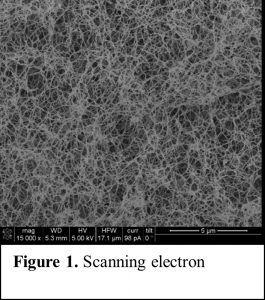Register for January 30 seminar presented by Nicholas A. Kotov
 The ECS Detroit Section invites you to “Composites from Aramid Nanofibers for Batteries” presented by Nicholas A. Kotov (University of Michigan) on January 31 at Mercedes-Benz Research & Development North America, Inc.
The ECS Detroit Section invites you to “Composites from Aramid Nanofibers for Batteries” presented by Nicholas A. Kotov (University of Michigan) on January 31 at Mercedes-Benz Research & Development North America, Inc.
Dr. Kotov is the Joseph B. and Florence V. Cejka Professor of Chemical Engineering at the University of Michigan. He has appointments in chemical engineering, biomedical engineering, materials science and engineering, macromolecular science and engineering, and the Biointerfaces Institute.
Pre-registration is required.
Registration deadline: Tuesday, January 28, 2025
Event Information
Title: “Composites from Aramid Nanofibers for Batteries”
Date: Thursday, January 30, 2025
Schedule: 1800h Posters & Dinner | 1900h Speaker
Location: Mercedes-Benz Research & Development North America, Inc.
35555 W. 12 Mile Road, Farmington Hills, MI 48331-3139
Fees: Registration includes dinner.
Professionals: USD $20
Student presenters: USD $0
Student non-presenters: USD $10
Pre-registration is required.
Registration deadline: Tuesday, January 28, 2025
Student Posters
A limited number of student posters are presented. To participate, contact the event organizers at ecs.detroit.rsvp@gmail.com. Each presenter receives one year of free access to Detroit Section events. An award is presented.
Abstract
 High-performance composites represent a bottleneck in energy technologies. These materials invariably exhibit a superposition of order and disorder, which can be described as their complexity. Performance and complexity are inherently intertwined, as repeatable structural patterns across different scales are synergistically integrated to achieve tunable combinations of electrode- or membrane-specific properties. This talk addresses the challenges and progress associated with structural description and materials design of composites with stochasticity and variability.
High-performance composites represent a bottleneck in energy technologies. These materials invariably exhibit a superposition of order and disorder, which can be described as their complexity. Performance and complexity are inherently intertwined, as repeatable structural patterns across different scales are synergistically integrated to achieve tunable combinations of electrode- or membrane-specific properties. This talk addresses the challenges and progress associated with structural description and materials design of composites with stochasticity and variability.
Addressing the technological bottlenecks of separators and gel electrolytes for batteries, we developed aramid nanofibers (ANFs)—a new nanoscale component for composites derived from Kevlar. ANF films and solids exhibit a combination of strength, toughness, nanoscale porosity, and roll-to-roll processing capabilities. ANF membranes can prevent dendrite formation—a common issue that reduces battery life—thereby significantly extending the lifespan of high-energy-density batteries. Thermal stability, with resilience to temperatures exceeding 250°C, positions ANF composites as a candidate for enhanced safety and thermal management. Utilization of ANF for batteries with tradition Li ion, Zn ion, Zn-air, and Li-S chemistries is discussed. In addition to separators, the utilization of carbonized ANF for cathodes is presented. ANF-based aerogels can also serve as highly efficient thermal insulators, benefiting from their lightweight, porous structure combined with thermal stability. Production of ANF-composites is facilitated by the direct recycling of Kevlar products including bulletproof vests, brake pads, truck tarps, etc., that are currently burned.
The structural design of ANF-based composites and similar materials can be accelerated by leveraging graph theory (GT) that can capture their complex organization with the balance of order and disorder. Evaluating critical parameters, such as reliability under stress, we developed a methodology for quantitative evaluation of their complex structural patterns for optimization of cyclability. These GT-based structural descriptors accelerate the development of ANF-based solutions for battery materials, enabling transparent data-conscious machine learning.
Nicholas A. Kotov
Dr. Kotov is the Joseph B. and Florence V. Cejka Professor of Chemical Engineering at the University of Michigan. He has appointments in chemical engineering, biomedical engineering, materials science and engineering, macromolecular science and engineering, and the Biointerfaces Institute. Dr. Kotov is a pioneer of theoretical foundations and practical implementations of complex systems from “imperfect” nanoparticles that offer a vast field for the application of data science and machine learning. Chiral nanostructures, biomimetic nanocomposites, and graph theoretical representations are the focal points in his current work.
After completing a BS in Chemistry and Chemical Engineering at Moscow State University in 1987, Dr. Kotov completed his PhD in Chemistry and Reaction Kinetics there in 1990.
The recipient of more than 60 awards and recognitions, Dr. Kotov founded several startups with his students that commercialized self-assembled nanostructures for the energy, healthcare, and automotive industry. He is a Fellow of the America Academy of Arts and Sciences and the National Academy of Inventors, and an advocate for scientists with disabilities.
Questions
Contact ecs.detroit.rsvp@gmail.com.
ECS Sections
ECS sections introduce and support activities in electrochemistry and solid state science within specific regions. Members have opportunities to engage and expand their professional networks. Not a section member? Email customerservice@electrochem.org now to join your region’s ECS section.

